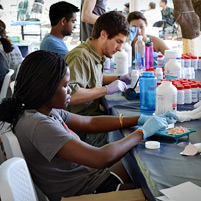Helping Hands

Konyin Adewumi (DC'16), Esteban Pacheco (E'15), Ash Sankar (S'16) and Elisa Pabon (S'16) count pills to take to a clinic.
Spending time working in medical clinics in Honduras isn't the typical spring break vacation for most college students, but it was spiritually fulfilling for 28 Carnegie Mellon University students.
Nicolas Zuniga-Penaranda (SHS'14), Lanya Tseng (DC'15) and Nicole Huang (E'16) were among students who traveled throughout communities in Honduras as part of the Carnegie Mellon chapter of Global Medical Brigades.
"For me, these trips have really instilled a sense of global community," Tseng said. "After being with Global Medical Brigades for three years now, I feel like when I go back, I have some kind of connection with all these places. I don't feel like I'm just going to save lives, but rather I'm helping people that I have a genuine relationship with."
Two dentists, one physician, one gynecologist and a pharmacist were among the Honduran doctors who accompanied the students as they assisted with medical clinics in Pueblo Nuevo and Apacilagua. Cardiologist Jose Pacheco, father of chapter member Esteban Pacheco (E'15), traveled to Honduras with the students to help out.
"While talking with [my father] about the two different communities, I got to really understand how even a small amount of infrastructure and money can change the effectiveness of medicine," Pacheco said. "I saw how my father tried his best to address what he could, but it was clear that continued support or changes in living arrangements would make the largest difference."
Huang said that the clinic saw people with colds, fungal infections, parasites and neurological problems among other problems.
"It was amazing to see how diverse the needs of the people were," she said. "but also how closely the needs followed certain trends."
Patients started out at the triage station, where they told two Carnegie Mellon students about their symptoms and conditions. After the students assessed them, the patients were sent to consultation stations where they received a diagnosis and a precise treatment plan.
Roughly $90,000 worth of medication and dental supplies were donated for the effort. Students collected the supplies from Rite-Aid, Pittsburgh-area dentists and pharmacists and nonprofit organizations including Brother's Brother and Global Links.
"It was really about empowering the communities. I looked around the clinic and it was mostly Honduran people directing the effort. They just needed to know what direction to go," Zuniga-Penaranda said.
The experience has helped Zuniga-Penaranda with his own direction. After graduation this year, he plans to work for AmeriCorps and apply to medical school.
In addition to the medical clinics, students led charlas, which means "chat" in Spanish. They helped stress the importance of health care and reiterated the significance of healthy living. Children from the communities went to a dental-focused discussion, where Carnegie Mellon students demonstrated how the children should floss and brush their teeth. The children received dental kits consisting of toothbrushes, toothpaste and dental floss.
Adults went to a separate discussion led by trained health workers from the community. There they learned about topics such as diabetes, high blood pressure and drinking water treatment.
"One of the biggest impacts we can have is not so much doing [tooth] extractions or giving people medicine, but encouraging education," Zuniga-Penaranda said. "Through education, we can inform patients on how to better themselves so we see less and less of them each year."
Along with the medical clinics and informational discussions, four days were spent in El Junquillo building trenches and laying down piping to help create a clean water facility that could provide fresh drinking water to more than 90 households throughout the community.
"It makes you really appreciate the standard of living in the U.S.," Huang said.
Not only did these Carnegie Mellon students help people in Honduras, they felt that they benefited from the trip, too.
"It was a two-way street. The people in the Honduran communities gave something back to us that you can't get anywhere else," Huang said.
Related Links: Global Medical Brigades | AmeriCorps | Dietrich College of Humanities and Social Sciences | Science & Humanities Scholars Program | Mellon College of Science | College of Engineering
